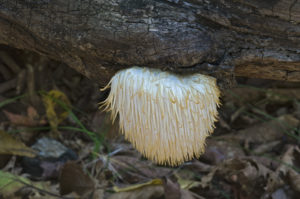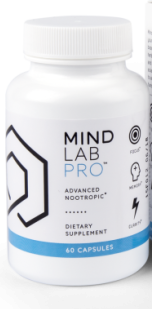Table of Contents
Lion’s Mane (Hericium erinaceus) is unique in the mushroom family both in appearance and function. Lion’s Mane Mushroom is extremely effective at stimulating Nerve Growth Factor (NGF) in the brain.
Known for its powerful effects as a “brain tonic”, Lion’s Mane is said to have been used as a tea for thousands of years by Buddhist monks. To enhance brain power, and heighten their ability to focus during meditation.
Lion’s Mane as a nootropic, is a powerful catalyst for brain cell regeneration helping improve memory and cognition.
The primary active compounds in Lion’s Mane are hericenones and erinacines. Erinacines help your brain produce more Nerve Growth Factor. Erinacines easily cross the blood-brain barrier to boost the production of neurons.
Lion’s Mane helps:
- Nerve Growth Factor. Lion’s Mane Mushroom prevents and treats nerve damage in the brain. Once past the blood-brain barrier, Lion’s Mane stimulates enzyme production that release Nerve Growth Factor (NGF). Nerve regeneration helps relieve neurodegenerative disease symptoms such as Alzheimer’s, dementia, and Parkinson’s Disease.
- Neurogenesis. Lion’s Mane stimulates the repair and creation of neurons. Boosting neurotransmitters and signaling that effects memory, learning, recall, and mood.
- Brain Optimization. Lion’s Mane helps eliminate brain fog. Restoring memory and mental alertness. And improves anxiety and depression symptoms.
Overview
Lion’s Mane (Hericium erinaceus) is a medicinal mushroom proven to benefit the brain, nerves and immune system.
Unlike other mushrooms sporting a cap and stem, Lion’s Mane has long, flowing, white tendrils. Resembling a lion’s mane. Other names include Monkey’s Head, Bearded Tooth, Pom Pom Blanc, Hedgehog Mushroom and Satyr’s Beard.

This parasitic fungus grows hanging off logs and trees. And is native to North American, Europe and Southeast Asia. In Japan, it’s called yamabushitake or “those who sleep in mountains”. Referring to the Shugendo sect of hermit monks and their long, flowing robes.
As a nootropic, Lion’s Mane has been shown to be particularly effective in stimulating Nerve Growth Factor (NGF) in the brain.
NGF is produced in the hippocampus throughout life. Modulating cholinergic receptors and neuroplasticity.[i] And is essential for learning.
Nerve Growth Factor are special proteins that function to regenerate neurons. Lion’s Mane contains two unique classes of NGF’s – hericenones and erinacines which easily cross the blood-brain barrier.
Lion’s Mane, like other medicinal mushrooms, contain high amounts of the antioxidant beta-glucoxylan and four other polysaccharides and polypeptides. Having a significant impact on enhancing your immune system. And decreasing tumor growth.
Lion’s Mane has also been studied in reducing amyloid plaques. These clumps of beta-amyloid proteins block signals between neurons. And are implicated in Alzheimer’s and other neurodegenerative diseases.
Lions’ Mane is also used to treat Lyme’s Disease, and digestive tract issues.
Here we’re talking about Lion’s Mane Mushroom and its effects on brain health and chemistry.
How does Lion’s Mane Work in the Brain?
Lion’s Mane boosts brain health and function in several ways. But two in particular stand out.
- Lion’s Mane Mushroom stimulates the synthesis of Nerve Growth Factor (NGF). NGF is a protein that plays a major role in the maintenance, survival and regeneration of neurons.
NGF is required by your brain to keep neurons strong and healthy. When various neurological disorders occur, your brain is unable to produce its own internal source of NGF.
In a study done in Kuala Lumpur in 2013, scientists showed that Lion’s Mane extract induced NGF synthesis and promoted neurite outgrowth.[ii]
- Lion’s Mane is effective in reducing anxiety and depression. Some even call it the “smart mushroom” for its ability to improve cognition, memory and work as an anti-depressant.
A study by researchers in Japan worked with 30 women. The female subjects had been complaining about menopause, depression, sleep quality and other issues.
The women randomly received Lion’s Mane-laced cookies or a placebo for 4 weeks. The researchers found that Lion’s Mane “has the possibility to reduce depression and anxiety, and these results suggest a different mechanism from NGF-enhancing action of H. erinaceus”. [iii]
How things go bad
Science once believed that the brain could not grow new brain cells. That once our brain developed during childhood, and we reached adulthood, we had all the brain cells we’d ever have.
Now we know that neurons can regenerate. But that doesn’t mean they will regenerate. A number of health issues can contribute to neurodegeneration.
↓ Decrease in Nerve Growth Factor = Decrease in Long-Term Potentiation affecting long-term memory[iv]
↓ Brain cells die and are not replaced
↓ Neuroplasticity declines resulting in poor memory
↓ Neurotransmitters decline resulting in anxiety, poor mood and depression
All of these age-related changes are contributing factors to neurodegenerative diseases like Alzheimer’s, Parkinson’s and others. And anxiety, depression and mood disorders that affect quality of life.
Lion’s Mane benefits
At least a dozen peer-reviewed studies have been published on Lion’s Mane benefits to brain health since 1991. Dr. Kawagishi of Japan was first to identify Nerve Growth Factor properties in Lion’s Mane Mushroom.[v]
In one double-blind, placebo-controlled trial, researchers in Japan worked with 50 – 80 year old men and women. All suffered from mild cognitive impairment.
The trial subjects received four 250 mg tablets containing 96% of Yamabushitake (Lion’s Mane) dry powder three times a day for 16 weeks. The men and women were tested at 4, 8, 12 and 16 weeks.
At each of the testing periods, the subjects who had used Lion’s Mane showed a significant improvement in cognitive scores. And their scores were increasing while on Lion’s Mane supplementation. But 4 weeks after stopping Lion’s mane supplementation, their cognitive scores decreased significantly.
The researchers concluded that Lion’s Mane Mushroom is effective in improving mild cognitive impairment.[vi]
How does Lion’s Mane feel?
You may not experience the effects of supplementing with Lion’s Mane Mushroom immediately. But many users report with continued use of Lion’s Mane, a boost in mood and mental energy.
 Some report it increases depth perception. And an improvement in sense of smell.
Some report it increases depth perception. And an improvement in sense of smell.
Others testify to improved decision-making, the ability to solve problems and learning. Likely due to Lion’s Mane ability to improve neuroplasticity.
The overall consensus is Lion’s Mane Mushroom’s ability to lessen anxiety, reduce depression, and improve concentration.
Lion’s Mane Clinical Research
Lion’s Mane Mushroom has been used as a food and herbal medicine since ancient times in East Asia. And it has been reported in scientific research that Lion’s Mane promotes Nerve Growth Factor both in the petri dish as well as in animal and human test subjects.
Lion’s Mane Prevents Cognitive Dysfunction
In this study, researchers examined the effects of Lion’s Mane on amyloid β(25-35) peptide-induced learning and memory deficits in mice. Amyloid β(25-35) peptide is implicated in diseases like Alzheimer’s.
Mice were injected with the peptide on days 7 and 14 of the trial. And they were fed a diet containing Lion’s Mane over 23-days of the experiment. The results showed that Lion’s Mane prevented short-term and visual recognition memory reduction normally induced by amyloid β(25-35) peptide.
They concluded that Lion’s Mane Mushroom “may be useful in the prevention of cognitive dysfunction”.[vii]
Lion’s Mane Induces Nerve Growth Factor
In this trial, mice were fed Lion’s Mane 5% freeze-dried powdered extract for 7 days. Researchers found an increase in the level of Nerve Growth Factor (NGF) in the hippocampus of the mice. Concluding that Lion’s Mane “contains active compounds that stimulate NGF synthesis”.[viii]
Lion’s Mane Repairs Nerves
In this study done with rats, Lion’s Mane extract was able to promote neuron regrowth after injury. Rats with gluteal nerve damage were able to walk again after consuming water containing Lion’s Mane extract.
The researchers concluded that Lion’s Mane regenerates damaged nerve cells. In this case, the reversal was so profound, the rats went from being totally disabled to walking again.[ix]
Lion’s Mane Dosage
Wondering how much Lion’s Mane to take? Dosing of Lion’s Mane Mushroom depends on the strength of the extract.
For Lion’s Mane 10:1 extract (30% polysaccharide), daily dosage is 500 – 1,000 mg taken 1 to 3 times per day. This means that if you choose a daily dose of 1,000 mg of Lion’s Mane extract, you should take 500 mg in the morning, and another 500 mg at noon.
Other retail extract dosage of Lion’s Mane ranges from 300 mg to 3000 mg dosed 1 – 3 times per day. Check the label and see what the manufacturer recommends. And when first using the supplement, start with the lowest dose and see how your body reacts.
Lion’s Mane Side Effects
Lion’s Mane Mushroom is non-toxic and considered very safe. So there are very few side effects reported.
Some neurohackers report itchy skin from higher doses. Likely attributable to a boost in Nerve Growth Factor.
Lion’s Mane has been tested in animals showing no side effects or toxicity even up to 5 grams per kilogram.
Best type of Lion’s Mane to buy
Lion’s Mane Mushroom (Hericium erinaceus) as a nootropic supplement is usually offered as an extract. In powdered form, or in a capsule.
 Lion’s Mane Mushroom can be found in some of higher quality pre-formulated nootropic stacks. For example, Click for Mind Lab Pro® contains 11 brain enhancing nootropic compounds including Lion’s Mane with the full fruit spectrum including hericenones and erinacines.
Lion’s Mane Mushroom can be found in some of higher quality pre-formulated nootropic stacks. For example, Click for Mind Lab Pro® contains 11 brain enhancing nootropic compounds including Lion’s Mane with the full fruit spectrum including hericenones and erinacines.
I recommend Mind Lab Pro® because it addresses all aspects of anxiety resistance, memory and cognitive enhancement, stabilizes mood, brain repair, and maintenance.
This premium nootropic stack is designed to affect neurotransmitters, cognitive energy, brain waves, neuroprotection, and regeneration. See my Mind Lab Pro review for a detailed report.
When choosing a Lion’s Mane supplement, there’s debate over the best form of extraction to achieve the mushroom’s full medicinal benefit. Some say your best option is a hot water extraction. Another says alcohol extraction. Another claims both are necessary.
But when it comes to mushrooms, saying that one is “more potent” than another is just too simplified to be true. This is as much an art as it is science.
Much more important is choosing a supplement that includes the mycelium of Lion’s Mane Mushroom. In this mushroom, the fruiting body does not contain erinacines which is the compound that boosts Nerve Growth Factor (NGF).
The nootropic benefits of hericenones only found in the fruiting body or top of the mushroom help support your immune system and get rid of Amyloid β(25-35) peptide implicated in diseases like Alzheimer’s.
The challenge is getting a Lion’s Mane Mushroom extract that contains the full spectrum found in both the mycelium and fruiting body. But the mushroom must be grown in liquid and not a solid substrate like grain. Otherwise you’ll get ground up grain without the important erinacines needed for increased NGF.
Look at the manufacturer’s literature and marketing material and find out how their Lion’s Mane is grown. And read the reviews on shopping sites as well as forums.
Types of Lion’s Mane available:
- Plain Lion’s Mane: Pure, powdered mushroom. Often freeze-dried, and the cheapest form available. Can be added to water, juice or smoothies.
- Lion’s Mane Extracts: A more potent form of mushroom. Often presented as 14:1 or 10:1 extracts (14 pounds or 10 pounds reduced to 1 pound of extract).
You will get 500 mg Lion’s Mane full spectrum extract in Click for Mind Lab Pro®
If you want a standalone Lion’s Mane Extract, I recommend Real Mushrooms organic Lion’s Mane Extract
- Standardized Lion’s Mane: Processed to provide exact levels of active ingredients. You can get Lion’s Mane standardized to 30% and 50% polysaccharides (including the active secondary metabolites hericenones and erinacines).
- Lion’s Mane tea: Since this is a popular mushroom in the kitchen, the taste is acceptable. But it’s hard to get a handle on how much actual active ingredient you’re getting.
- Amycenone®/PLM-Fraction: This “branded” product is standardized to Hericenones 0.5%, Amyloban 6%. It seems to target a lesser-known Lion’s Mane active ingredient–Amyloban–which is positioned as a mushroom compound that fights beta-amyloid proteins. Originating in Japan, it is extremely expensive, and may be found in a supplement called Amyloban®3399.
And if you decide to pick your own, before consuming any wild mushroom, make sure that it is accurately identified. Mushroom poisoning is a real problem if you pick the wrong one.
For a full list of Mycology societies that may be able to help you, go to the North American Mycological Association website (www.namyco.org).
Nootropics Expert Recommendation
Lion’s Mane 500 – 2,000 mg per day
 I recommend using Lion’s Mane as a nootropic supplement.
I recommend using Lion’s Mane as a nootropic supplement.
Your body does not make Lion’s Mane on its own. So you need to take it as a supplement.
Lion’s Mane is especially helpful for regenerating brain cells. It prevents neurodegenerative diseases like Alzheimer’s and Parkinson’s.
And it boosts long-term potentiation for memory and mental sharpness. By stimulating Nerve Growth Factor.
Lion’s Mane also helps boost mood, tame anxiety and relieve depression. For a better quality of life.
We suggest starting with a dose of 500 mg daily. The best human study used 3000 mg per day. But another researcher found lower concentrations may stimulate NGF better than higher concentrations.[x]
Start at 500 mg per day and see how it works for you. If you don’t experience a benefit, boost Lion’s Mane in small increments of 250 mg per day until you notice an improvement. And make sure you are using a supplement containing the mycelium and fruiting body that is grown in a liquid medium.
You can buy individual Lion’s Mane supplements. Or you could try my favorite pre-formulated nootropic stack Click for Mind Lab Pro® which includes the full spectrum including hericenones and erinacines found in Lion’s Mane Mushroom.
Mind Lab Pro contains a synergistic blend of 11 brain enhancing nootropics covering all aspects of cognition and brain health. See my full Mind Lab Pro review for more.
Lion’s Mane is a great compliment to a nootropic stack including Aniracetam, Alpha GPC and Omega-3’s for an immediate cognitive boost.








Join The Discussion - 408 comments
Rocco
March 5, 2021
My mother has Alzheimer’s and is on medication for it, donzapil and memantine. Would it be safe for her to use lions mane while taking these meds?
David Tomen
March 6, 2021
Rocco, I am not aware of any contraindication.
KARIN
March 3, 2021
Hi David,
I was interested in Lion’s mane to improve my son’s ability to focus, concentration and memory at school, including motivation to do home/classwork that’s been incredibly low for the past 3-4 months. He’s being diagnosed with a mild case of ADHD (borderline), but haven’t found much information for kids/teens. He’s 15 1/2 and takes growth hormones (somatropin). Do you think is it safe and beneficial for him to take it?
David Tomen
March 3, 2021
Karin, I can’t recommend anything for a 15 yr. old because I’m not qualified. But I do know for sure that Lion’s Mane is safe if used at recommended dosages.
But if he is clinically ADHD it’s likely he’ll need more than Lion’s Mane. Because ADHD is a problem with dopamine and norepinephrine and how these neurotransmitters are used in the brain.
See if you can find a naturopath or alternative medicine practitioner who specializes in kids. And understands how to use L-Tyrosine to increase dopamine, CDP-Choline to boost acetylcholine and DHA to keep brain cells healthy.
KARIN
March 4, 2021
David thanks so much for your response and sharing your knowledge
Carol
March 2, 2021
Lion’s Mane (I get it fresh and sauté it and put it in soups and stirfry) gives me a tingly rush to the head. This freaks me out. And yet every few months I buy it at the farmers’ market and try it again.
David Tomen
March 3, 2021
Sounds like you should do Lion’s Mane more often Carol. 🙂
Ryan
February 23, 2021
Hi David,
In doing some research on Lion’s Mane I read, “alcohol is used to extract the adaptogenic fat-soluble compounds– hericenones and erinacines, and possibly amyloban, while the hot-water extracts the immune-modulating beta-glucans (water-soluble polysaccharide compounds).”
If you are purchasing Lion’s Mane that uses dual extraction, including the fat-soluble compounds, does this indicate that it should be taken with fat in order to be better absorbed?
Thanks for any help you can give!
Ryan
David Tomen
February 23, 2021
Ryan, anything that is fat-soluble needs to be taken with a healthy fat or you will not digest it. Just excrete it unused. Because the healthy fats activate fat digesting enzymes courtesy your pancreas that are send out to digest fats in your diet.
Ryan
February 25, 2021
Ok, prefect- that’s what I was needed to know.
Thanks for the response!
Ryan
Arik
January 27, 2021
Hi David, hope you’re well?
I just received lions mane from time health, they have three different types and I got their high strength one.
Although now I am reading that this could reduce mens libido, and I am reading quite a bit of forums on reddit of people attesting to this drop in sex drive, I would like to know your take on this?
Thanks
Arik
January 27, 2021
Have you personally experienced this?
David Tomen
January 27, 2021
Arik, I use 1,500 mg Lion’s Mane every day and have definitely not experience a drop in sex drive or libido.
Arik
February 17, 2021
May I ask what you think of this lions mane supplement, its a uk brand as I reside in UK.
Time Health Lion’s Mane extract
David Tomen
February 17, 2021
Arik, it looks like a quality supplement. I suggest reading the user reviews and see if the company will share a Certificate of Analysis for the Lion’s Mane you wish to purchase.
If they cannot or will not provide a CofA for that batch of Lion’s Mane move on to another manufacturer.
Arik
February 17, 2021
Okay thank you, would you have any brand suggestions though?
David Tomen
February 19, 2021
Arik, Mind Lab Pro (https://bit.ly/3lh3w8a) includes 500 mg of Organic Lion’s Mane and they use the fruiting body which contains the beta glucans you need.
Or as a standalone supplement I recommend this one: https://amzn.to/3qAQjcv
Adam
January 12, 2021
I was having some focus/concentration issues so decided to give this a try and have been experiencing some very positive results from it. I have not had a ton of success with the majority of supplements I have tried, but this Lion’s Mane (I am using Nootropic Depots 8:1 Fruit Extract) has been a pleasant exception.
June
January 6, 2021
I’m so glad I found this! I have been suffering for 7 years from post withdrawal syndrome from getting off antidepressants that I was on for 10 yrs and a brief stint of benzodiazepines. Benzo withdrawal rendered me practically brain dead after just 2 months use. My brain sputtered along trying to heal for 7 years, being mostly house and bed bound. I have not recovered my short and long term memory, ability to read, no natural ability to sleep, slow speech, obsessive compulsions, anxiety through the roof, have neuro-emotions etc. I also have sensory distortion, inability to comprehend simple things, have induced ADD and just an overall detachment to things around me. The list goes on. I can’t remember the last 15 yrs of my life. I’m not even going to touch on the subject of what it has done to my bowels. Lets just say movements are almost non-existent there too. Lions mane is my last resort. I am curious if the neurogenesis is permanent from Lions mane once it has regrown neuro structures. I don’t want to become a new person, but I do want to recover what I have lost. I want to get back to baseline of where I was before I ever took those prescription pills, when I was still me. Not the shell I have become. Will this work?
David Tomen
January 7, 2021
June, Lion’s Mane is a great choice and yes it’s effects are “permanent” as long as you continue using it. Don’t forget your brain is always growing new neurons.
I suggest taking a look through this as well for some other options that may help you: https://nootropicsexpert.com/13-nootropics-to-boost-bdnf/
And get your microbiome back in shape as well. A high quality prebiotic is your best option for that: https://nootropicsexpert.com/best-prebiotics/. And add Quercetin to your daily regimen as well which will help heal your leaking gut: https://nootropicsexpert.com/quercetin/.
June
January 10, 2021
You don’t know how much your post means to me! It gives me immense hope. I have been through a few of the nootropics from your impressive list. Unfortunately my body was too sensitive to enjoy their full effects. Some on the list I didn’t even know were nootropics!
So what I gather is that Lion’s Mane will facilitate change only when I am taking it? Doesn’t it work simultaneously with the body’s natural ability to grow those neurons and keep them?
Regarding the prebiotic, I’ve always followed the logic of probiotics and more probiotics! I may have a mild case of SIBO due to the immobile gut. Would prebiotics create more of an issue or should I wait till SIBO is completely eliminated? Thanks again.
David Tomen
January 10, 2021
June, Lion’s Mane increases Nerve Growth Factor which is required for the neurogenesis your brain needs to grow new neurons. And to help repair damaged neurons, dendrites, axons, and synapses. So Lion’s Mane supports your body’s natural ability to grow new neurons. And continued use will help you keep them.
If you are using antibiotics to heal Small Intestine Bacterial Overgrowth (SIBO) it is wise in my opinion to use carefully chosen probiotics to replace what the antibiotics killed. And Prebiotics to support your gut’s natural ability to grow new beneficial bacteria.
June
January 14, 2021
This is all so encouraging! I feel more confident that this is the direction to go. Though the probiotic route is a bit more tricky since there is a laundry list of probiotics and too many to choose from. Wouldn’t even know where to start with that! But the prebiotics sound like an interesting topic. I wonder if eating some chicory would help.
David Tomen
January 14, 2021
June, eating some chicory root may help. But you would need to eat much more than I think you’ll find acceptable to get the benefit that you’d get from an extract supplement.
The key is getting enough soluble fiber and making sure it is delivered to the section of your gut where it provides the most benefit. This is often only accomplished by using a supplement that is encased in the type of capsule that safely makes it through your digestive system. And to where it’s needed most.
If you used an ‘ordinary’ capsule the contents would be digested by your system and never make it to the section of your gut where it’s needed.
June
January 20, 2021
Thank you for this invaluable advice! I will be back to update later on how these have helped after I implement them for a short while! Wishing you best of health!
Yujin Park
January 5, 2021
Hello david ! I need a good Nootropic to learn English –
1 month after starting lions mane following your advice this is the best supplement and helps my add !!!!
Bear with me as I can not explain my question well . Would you recommend lion mane with Phosphatidylserine with lion mane or is there perhaps some other blend or vitamin that won’t break the bank – lion mane helped my ADD a lot! Thank you but gingko and ashwagandha did nothing.
I can afford one more supplement I am confuse! – Phosphatidylserine or alcar or something else? you mention Phosphatidylserine for add – so I am asking here! I am here Learning English and can not afford the Mind lab pro for 200$!!!!!! OMG HOw is a vitamin 200$$$$$ My diet is not great, so limited but I take vitamins – How can we help the channel? I will buy your book !!!!!!! see as I said those 2 supplements plus a few others did nothing I know trial and error but I found lion mane – you would go with PS above say also or noopept ETC for learning and memory? lion mane had a mild stimulant effect which I DO need to cut down on ADD medication but it does work !!!! Als ois ALCAR called racetam , Aniracetam with – phenylpiracetam were gream but tolorane was in 1 week !
Thank you – alpha gpc , L-theanine, and lion mane is al so so so amazing! if I can afford one more supplement to compliment lions mane to learn well you’d you g with PS ?
David Tomen
January 7, 2021
Yujin, Phosphatidylserine (PS) is likely your best option for learning and memory and much more. See my review on PS here https://nootropicsexpert.com/phosphatidylserine-ps/. And scroll down to the section: “How does Phosphatidylserine feel?” Those comments come from real people.